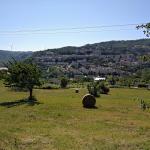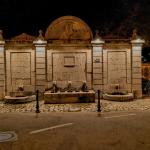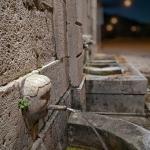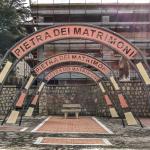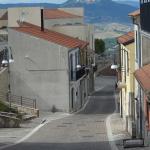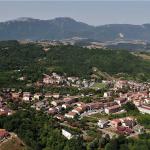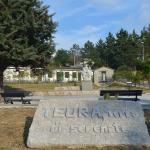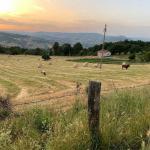The Municipality of Teora is located in the Upper Irpinia area. It's a town with 1,476 inhabitants, located 660 metres above sea level, at 58 km from Avellino. The territory extends for 23.21 sq km and the adjoining municipalities are: Caposele, Conza della Campania, Lioni and Morra De Sanctis. It's crossed by the Ofanto river.
The etymology of the name probably comes from the Latin tugurium, whose plural is teguria, meaning huts, referring to the shelters built by the Samnites. The inhabitants are called Teoresi and Saint Nicholas of Bari is their patron saint.
PLACES OF INTEREST
- Church of San Nicola (Saint Nicholas) - Religious building erected in the 1980s, alongside the old church, which was destroyed by the 1980 earthquake
- Piano fountain - Also known as the Tarantini Fountain, it is made of light-coloured stone
- Stone of Civil Weddings - Located in Piazza Congrega, it's a stone table on which public deeds were drawn up and civil weddings were held
- Church of San Vito (Saint Vitus) - Religious building, able to withstand the tremendous earthquake of 1980
- Corona Mill - Dating back to the end of the 18th century, it is located on the edge of the historic centre of the town
- Fountain of the Dead - Dating back to the 12th century, it's the source from which the chariot horses, heading to Conza to bury the corpses, used to drink
EVENTS
- Tomacelle Festival - Food and wine event, accompanied by the Li Squaqqualacchiun 'parade, a typical Teora mask that opens the carnival festivities, scheduled for January
- Feast of the Pesatura (Weighing) - Traditional event, scheduled for July
- Saint Martin's Pizza - Food and wine and religious event, scheduled for November
- Serenade Festival - Summer event dedicated to the ancient tradition of Teora serenades, scheduled for August
- Good Friday - Via Crucis in the streets of the town, scheduled during the Easter holidays
- Feast of the Cross - Religious celebrations, scheduled for the month of May
TYPICAL FOOD AND PRODUCTS
- Tomacelle - Typical dish, similar to a meatball, consisting of pork offal, cheese, eggs and horseradish root
- Saint Matin's Pizza - Potato gâteau prepared with milk, eggs, salami, cheese, parsley, mozzarella, salt and pepper
- Bucatin cu lu frisc - Typical first course, made with bucatini and pork sauce, tomatoes and pickled peppers
- Caciocavallo Silano PDO - Semi-hard cheese, with spun curd, produced with milk from different breeds of cows, including Podolica
- Caciocavallo irpino di grotta PAT - Spun curd cheese, produced with milk from small and medium-sized farms, mainly from brown cattle, traditionally aged in caves
FUN FACTS
In Teora, the "pesatura" is linked to the choral rite of wheat harvesting and separation, by means of the "weighing" of the ear of wheat.
Teora is a land of serenades: in the village, no one in love can get married without first having dedicated a public serenade to their beloved.
During the celebrations in honour of Saint Martin (11th of November), the citizens enjoy the "Saint Martin's Pizza", the traditional potato gâteau. Each portion of the pizza is served with a coin inside, able to give those who find it the "power" to order lunch for the diners on the 21st of November (the so-called cummit, the Banquet).
HISTORICAL NOTES
Born from a previous pre-Samnite settlement, Teora was part of the territory of Conza both in Roman times, as documented by the findings of pit tombs in the Oliveto-Cairano area, and in medieval times, following its historical events for a long time.
Mentioned in 1098 in a bull of Pope Urban II and in a subsequent notarial deed of 1332 as a fiefdom of Filippo di Tigora, a local noble, Teora was administered by the Gesualdo, Ludovisi and Mirelli families; the latter remained at the helm until 1806, the year of the abolition of feudalism.
The earthquake of the 23rd of November 1980 severely hit the town, destroying numerous testimonies of the past, including the baronial palace, the Church of San Nicola di Mira and Casa Mazzeo. No trace remains of the Lombard castle, in the locality of Boiara and already hit by the earthquake of 1732: it is known that it was renovated in the Aragonese period and that it had cylindrical towers founded on an escarpment base.
Teora and its "Squacqualacchiun" are always ready to welcome those who want to live moments of inebriation, joy, escape, freedom
Teora
Largo Europa, 8, 83056 Teora AV, Italia
Events
-
On January 26th and 27th, the ritual of the typical Teorese mask will officially kick off the…
Featured places
Via Ruggero Bonghi, 83056 Teora AV, Italia
The new Mother Church of Teora stands alongside the ruins of an earlier religious building and…
Largo Europa, 11, 83056 Teora AV, Italia
Also known as the Fontana dei Tarantini, it stands out for its imposing structure and for the…
Largo Europa, 83056 Teora AV, Italia
Located on Piazza Congrega, it is a stone table on which public deeds were drawn up and civil…
La Fontana lavatoio, Largo Europa, 11, 83056 Teora AV
Dating back to the 12th century, it is the source from which the horses of the carts headed to…
Teora, 83056 AV
Dating back to the end of the eighteenth century, it is located on the edge of the historic…
Did you like it? Leave a review
Your opinion is important! It will be visible after approval by the editorial staff.
To post a comment you must be an authenticated user. Log in with Social Login
